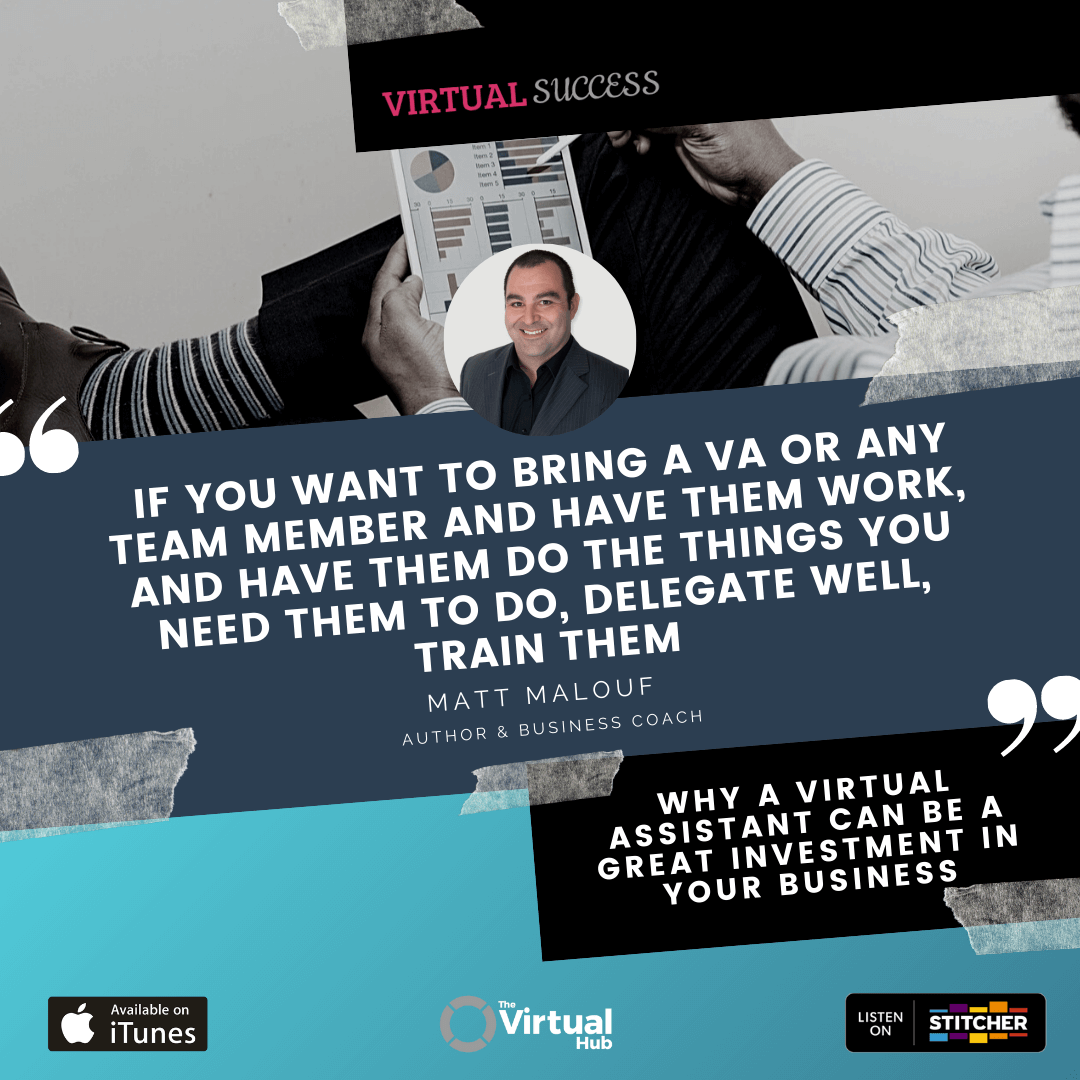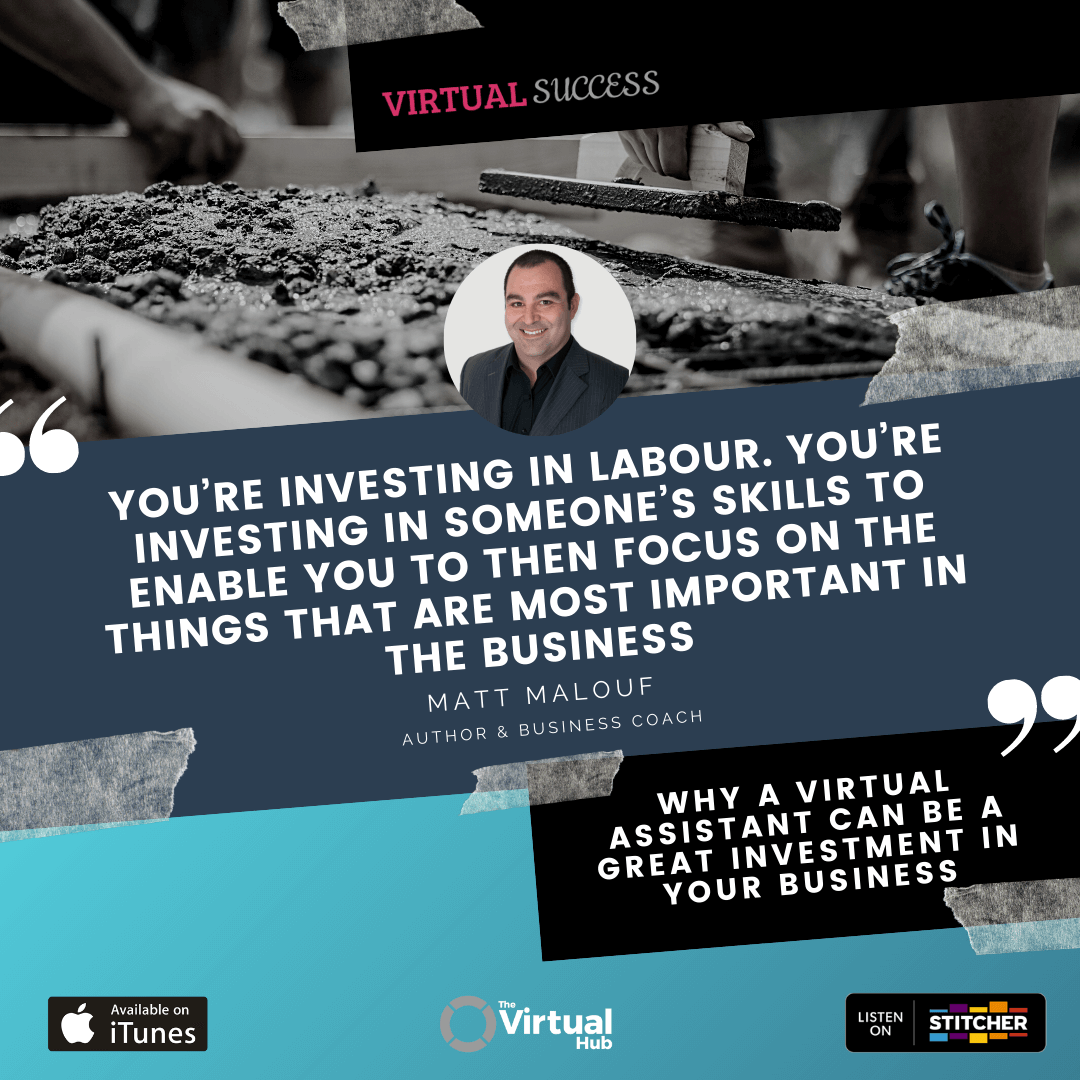Why a Virtual Assistant Can Be a Great Investment in Your Business
Want the transcript? Download it here.
In this episode, we take a look at the positives of bringing a Virtual Assistant into your business and how you need to look at your VA as an investment in your business rather than an expense.
This episode is full of insights from Matt and Barbara into answering the common question of “Well, what can a Virtual Assistant do for me?”
Some of the areas covered include:
- The importance of understanding the value a Virtual Assistant can add to your business
- Why you need to adopt the mindset of your Virtual Assistant being an investment rather than an expense
- Accepting that it takes time to transition your Virtual Assistant into your business
- Tips on speeding up the transition process
Let us know what your key takeout has been from this episode and join the continuing conversation over in the Virtual Success Facebook Group.
Resources mentioned in this show:
The Stop Doing List – www.stopdoing.com.au
In this episode:
01:30 – What can a Virtual Assistant do for me?
03:35 – The mindset of ‘Investment vs. Expense’
04:34 – Will I get a return on my investment?
07:30 – Setting your Virtual Assistant up to win
12:26 – Misconception of the super VA
14:30 – Speeding up the transition process
15:45 – A bit about Matt’s book – The Stop Doing List
19:04 – Wrapping things up
Matt: Hey everyone, welcome back to another show of the Virtual Success Show. I’m joined again by my wonderful co-host, Barbara Turley. Hey Barb!
Barbara: Hey Matt, how are you?
Matt: I’m excellent. How are you going?
Barbara: I’m good, I’m good and loving all these shows we’re doing, I’ve been this week listening back to a few of the older shows and some of the tips and stuff we’ve been talking about, because I’m actually revamping some of my own processes in my business and I just pick up such great stuff, even from the stuff that we talk about and some of the guests that we interview, so yeah it’s been a good week for that.
Matt: Excellent. Excellent. Well, I’m really excited about today’s show too, Barb, as we were talking about just before we started recording and what we find in both Barbara’s business and what I do as a coach is we’re constantly asked, well what could a VA do for me? I think a lot of people like the idea and understand the concept of having a virtual assistant, but they’re not really sure on what a VA can do for them or for their business. Barb, do you find this?
What can a VA do for me?
Barbara: Yeah. Yeah, a lot. You know we get, I’m actually to add to that one of the things that I hear quite a lot as well is, I’m not sure what a VA can do for me and then there’s also a little bit of confusion about what a VA doesn’t do. So implicit in that, sometimes people have an expectation that they can do, this superhero VA type thing, the myth of the superhero VA that they can do everything possible, from video editing to web design and all the sort of things in the middle. So it’s a very broad topic and problem right there.
Matt: Absolutely and I think what this leads into is people having a clear understanding of the value that a VA can bring to their business. Because one thing I see is people grappling with the decision on, well, okay … This is an extra cost in my business. Am I going to get my return? And I think if you start with that mindsetaround this, then in my experience you’re actually setting yourself up to fail right from the start.
Barbara: Yeah, so Matt, you know one of the things that we see as well, when people are booking calls with our ad sourcing strategy consultants at Virtual Angel Hub we ask them a series of questions because we’re trying to get an insight into where they’re at before the call and one of the questions we ask is, ‘what’s your biggest fear about hiring a VA or working with a VA?’ And often one we see, the comment is, the cost and the ongoing financial commitment. Which I find quite interesting because if you’re running a business and you’re willing to hire a VA, they’re not that expensive, so sometimes it makes me wonder, are you ready for a VA or should you take a step back in that business and say well, let’s have a look at your product, I mean what are you selling? Have you got product to market fit right? Have you tested your sales? To get rid of this fearbefore you start to grow it.
What’s your sort of take on this Matt, because from a business coaching perspective I’m interested to hear how you feel about this.
The mindset of ‘Investment vs. Expense’
Matt: Yeah, you know it’s one of the areas that I wrote about in my recently launched book – The Stop Doing List – which I think the biggest thing around this Barb, is that mindset of investment versus expense. And you see, when you’re bringing on a VA or any team member for that matter, it is an investment. You’re investing in labour. You’re investing in someone’s skills to enable you to then focus on the things that are most important in the business.

What often hampers the growth of a company is the owner being pulled in every direction to try and do everything or learn everything. And fast growing and consistent growing companies understand that they’ve got to build teams around them and so that every person they bring on is an extension of themselves and they’re actually buying back time. Hence it’s an investment which pays off, not a cost.
Will I get a return on my investment?
Barbara: Now Matt, I’ve got such a great question to ask you. I’ve just been listening to you talking and going, okay so another sort of follow on question or query that we get from clients and again it’s a legitimate one, they say another fear is that they won’t get a return on their investment, so that the first set of people will say I’m worried about the cost. The next set of people will say I’m worried I won’t get a return on my investment. Because obviously, it is an investment. So some of these people I wonder, well, what return are you expecting? You’re sort of expecting a VA to make money for you when really it’s sort of your jump to go ahead and make the money and use the VA to free up your time. But it’s going to take time to get to the point to where you get a return on your investment from a VA because you’ve got to train them, right?
So how do you deal with, where’s this line on this one?
Matt: Yeah it’s a great question. I think there’s a few aspects to this. In order to assess your return or the value return, you’ve actually got to create a measure for it. So one thing that I created in the Stop Doing system was first and foremost you have to get clear on what an hour of your time is worth. And so it’s a simple formula. You’re getting clear on the profit, your goals and what you’re trying to make. How many weeks of the year you want to work and then how many hours per week you intend working. Because then once you actually get a clear understanding and metric on an hour of your time, it’s actually really easy to then compare and go well, if I invest into a virtual assistant and I’m paying, what, between eight and 10 dollars an hour, Barb? Would that be reasonable?
Barbara: Yeah. Yeah. Even if you get an Australian or an American VA at higher prices, I would tip that most people are hopefully making more than that in their hourly rate in the business anyway.
Matt: Exactly. And so, majority of people will, even in start-up phase when you look at your initial projections, on what you’re looking to make for your business. If you then put an hourly rate against that, then all of a sudden, a resource at eight, 10, 20 dollars an hour seems really reasonable and it’s really easy to get a return.
Now the second part of this is if I invest, we’ll just use the scenario of a VA where the investment’s $10 an hour.
Barbara: Yeah.
Matt: If I invest in $10 an hour and I can offload certain tasks which frees me up to then go and focus in on the most important money-making activities – so more marketing, more selling, more proposals, whatever it might be in your business. As long as that time is re-invested in that way, into those important tasks, the return becomes infinite.
Setting your Virtual Assistant up to win
Barbara: Yeah. Now I’ve got something to just intersect here with and again I know what the answer to this is, but I know that some of our clients would come back and say, I get that but I’m spending all of my time training the VA. So let’s say your time is more at the $150 an hour or whatever and your VA is $10 an hour. And some clients don’t realise that there is a transition phase where yes, you will still be using your time or maybe a substantial portion of your time still while you’re transitioning to a VA at $10 an hour.
So it’s not going to happen overnight. So how do you sort of get people past that? That is a mindset issue.
Matt: Hundred percent. There’s two sides to that. First and foremost is the immediate tasks I want to leverage to a VA and delegate to them are the tasks that they’ve identified in the interview process that they can do without thinking. They’re already trained in. So what you’ll find is that in most instances, there’s probably five to 10 hours worth of work a week that they can do without very much training because they’re already trained in those things.
Secondly, that is to look at, well for every hour that I invest and you may want to set a little target around this. Let’s say I’m going to invest, we’ll just use some simple math. Let’s say it’s 10 hours a week and on that $150 an hour, so I’m going to invest $1,500 a week of my time to train this person and set them up to win, knowing that if I do this consistently for say, six to eight weeks that at the end of that six to eight weeks, they’re going to be able to do these other eight tasks and I’m going to buy back another 10 to 15 hours a week.
Barbara: Yeah that’s a great way of looking at it because I think it’s a more realistic way of looking at it as well. You know, one of the challenges I face in the market and I saw it again, I saw a webinar where someone in America talking about VA’s and you know, she just made it sound so easy. You just all you got to do is this, this and this. And really, you know with any team member, it doesn’t matter where they are in the world unless you’re hiring a specialist who is, can step in and just take something over for you. If you’re hiring someone who’s on a lower level, like a VA or an assistant or whatever, you need to allow time for this transition process to happen.
As Matt, you’ve done it in your business. I’ve done it over and over and over and over again in my business obviously and I just cannot tell people enough how good the dividends are that you get paid in the end, once you focus on this transition time and accept that it is an investment of your time, that you have to invest to get this right. And the dividends will be higher than if you didn’t do this at all. If you just continued to do everything yourself.
Matt: Absolutely. And then I think we need to put things into perspective with this, Barb. Which is, if my time is worth $150 an hour and I’m investing in someone at $10 an hour, even if it takes them three times the amount of time it takes me, I’m still way ahead.
Barbara: Absolutely. Absolutely.
Matt: And that’s never considered in what I see. Because everyone wants their VA to do it as quick or quicker than what they do. And they don’t have the experience and they don’t have the skill yet to be able to do that. So I remember my mindset coming into a virtual assistant, I worked it out, my first VA, I had a part-time VA many, many moons ago and the investment was $250 a month, part time. And I just had the mindset that, you know what, if I was to employ someone locally it was going to cost me $30 an hour, so if I got eight hours of productivity a month out of that person, that was break even and anything above that was a bonus.
Barbara: You know what, I’ve actually had people on my team that … I’ve had people on my team idle for six weeks. In January I basically said to them all, look, I gave them all a couple projects to do and things to work on and I basically said look, I’m away. I don’t expect you to be working all the time, just report in on these particular projects. And the reason I was happy to do that was because I also thought, well they push hard all year, am I going to be stressing myself trying to worry … Am I getting every squeeze the lemon for every minute of time that I’m paying for, or do I just say, look it’s January, you know I’m away … Just do these projects and let’s reconvene in February and it worked a dream. Because everybody came back alive, rested, enthusiastic for the year ahead. It worked really well for me. So I don’t see clients doing that very often, and I think that pays dividends as well. Again, that’s a mindset thing though.
Misconception of the super VA
Matt: Absolutely. Absolutely and so I think the … I think we also, well I see often and Barb I know you and I talk about this, is this misconception around, and we mentioned it earlier on this whole super VA, how virtual assistants are people. If you employ them in your office of they’re sitting in the Philippines or somewhere else in the world, they’re a person, they’ve got specific skills, they’re going to make mistakes. They’re going to have to go through a learning process. And I think it’s just setting these realistic expectations of yourself and of them right from the start.
You’ve got … One little exercise that I do with clients regularly is I say take your pen in your non-writing hand and write your name. And you know, for most people have been writing our name with our natural writing hand since we were, I don’t know, maybe four or five years old, maybe younger. You take your non-writing hand and you do that, and you’ve got to think about that. Even though you know how to spell your name and even though you know how to write and for many of you, hiring a team member whether it’s locally or overseas, it’s the first time you’ve done this. And it’s like writing your name with your left hand.
Now if I asked you to write your name with your left hand just every now and then you’ll probably find, number one, you’ll have to do it quite slow. Number two, it’s a bit messy, it’s not neat and it feels awkward. Then if I ask you to do it with your natural writing hand, you could probably do it with your eyes shut and it would be neat because you’ve been doing it repetitively over time, every day, every day, every day.
So what you’ve got to understand is if you want to bring a VA or any team member and have them work, and have them do the things you need them to do, delegate well, train them, etc. It’s practise for you as much as it is for them. Because this is like you writing your name with your left hand.

Speeding up the transition process
Barbara: And Matt, you know, another area of your book which I just love, which I was thinking as you were talking there it leads us into this. If people want to make this faster, let’s say you want to make this transition period a little bit faster, what my recommendation and I know yours, your book dissects this, is, if your processes are rock-solid, now I’m talking you can give them to anyone and they can successfully do that process for you, it’s going to be much faster and you’re going to get to return on investment much faster than someone whose business is kind of all over the place with no systems, no processes and you’ve never really thought about how you do things.
Matt: It’s the recipe for success because you’ve downloaded from your head your knowledge on how you want something done. It’s like baking a cake, isn’t it? You get the ingredients, you follow the recipe and if you do it consistently you’ll get the same outcome.
Barbara: Yeah. Absolutely. Now I know Matt in future shows we’re going to be getting more into the strategies you talk about in your book and dissecting them even more because it’s just so pivotal, so do you want to give us a quick … I think to maybe end this but, do you want to give us a quick synopsis of the book and what’s to come in our future shows?
A bit about Matt’s book – The Stop Doing List
Matt: Sure. Sure. Absolutely, so the book was written for the intention of helping, around this topic of what can my VA do? Or how do I actually continue to focus on growing my business? And so over the years I understood and through working with many people that it’s more about what you stop doing, than it is about what you do. And when you focus on what you stop doing, you then have more time to focus on what I term your ‘genius’ in the book.
So the book is a system. It systematically shows you the mindsets that are essential and need to be adopted in order to succeed in leveraging and delegating. It then helps you to identify all of the tasks that you’d love to leverage or delegate. It helps you identify what your genius is, but then most importantly, I’ve developed a system to help you then take that list and actually stop doing it. And this is all around imparting knowledge with people, training them, building the systems, utilising technology, but then more importantly it’s all about how do you give a team member permission to take responsibility for the tasks or their role. And then how do you manage them. It’s a combination of all of these that really leads to somebody’s success, or failure, in leveraging and stop doing.
I think that one thing that I talk about in the book and I want to leave everyone with this because it’s so important. If all you did today was start, have a piece of paper next to you and every little thing that you did, you started to document and note, do I love doing this? Or would I rather someone else doing this? Very, very quickly you’ll have a clear job description of what you would have somebody else doing for you. And what the book does is it takes that list and then teaches you how to stop doing those things forever.
Barbara: You know Matt, for the listeners out there, this is one of the reasons, you know a Virtual Angel Hubwe’re working very closely with Matt because on this, on the concepts and the systems he’s built through the stop doing list book, because it’s so pivotal to the clients we see getting success versus the clients who fail. The ones who actually follow this kind of system that we propose as well get a lot of success, so yes … Fantastic. And there’s nothing out there in the market like this, not really. There’s a lot of focus on delegating and start-ups and scaling businesses and growth, marketing, all these things, but a lot of people get left kind of hanging when it comes to this ‘internal leverage’ as I like to call it that you get from getting a well-oiled machine going in your business. And your book framework deals with that.
So where can we get the book? It’s out now isn’t it? In the airport?
Matt: So yeah, first of all you can go to stopdoing.com.au and learn a little bit more about it, but also too it’s available in Booktopia, it’s available in Dymocks and other online retailers also.
Wrapping things up
Barbara: Yeah and we’re going to have little, we’ll have all the links in the show notes and I’d encourage anyone, I’m about to dive into reading the book completely because it’s just come out now so I’m very excited about looking at what I can implement in my business from the book. Listen, Matt, it’s been great, thanks so much for those tips today, as always. It’s like free coaching on this call which is just amazing. So to the listeners, thanks again for tuning in. If you’ve got any comments, please leave us a comment below or on iTunes if you can subscribe to the show and leave us a review and a rating, we’d love to hear from you and it helps to get the show out to more people which would be really helpful.
Matt: And also too, send in what you’d love to hear more about, because Barbara and I are constantly conversing on what are the challenges we’ve helped our clients with, what are we hearing people wanting to learn more about. Please feel free to put comments around that because we’d love to make sure that we can fulfill what it is that you’re looking to learn on this show also.
Barbara: Yeah we’ll do shows on that. Great. Well, listen, thanks, Matt. Until next time, thanks, listeners. We’ll see you then.
Matt: Thanks, Barb.
The Hosts
 Matt Malouf
Matt Malouf
Matt Malouf is a passionate business coach, speaker, author and entrepreneur on a mission to help entrepreneurs around the world break the shackles of mediocrity and reach new levels of personal and business success.
 Barbara Turley
Barbara Turley
Barbara Turley is the Founder & CEO of The Virtual Hub, a company that specializes in recruiting, training and managing superstar ‘Virtual Assistants’ in the social media, digital marketing and systems automation space.
